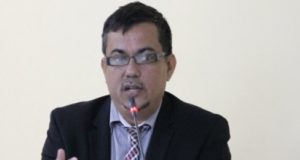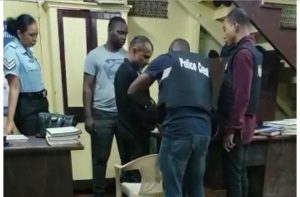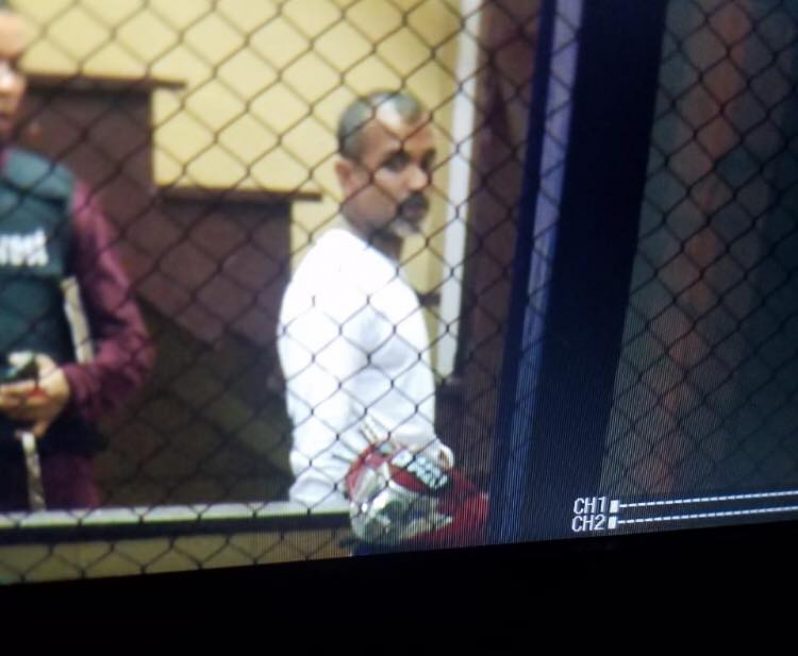– as police grill him for murders of Waddell, boxing coach
NOTORIOUS drug trafficker, Shaheed “Roger” Khan, who returned to Guyana on Friday after serving just about 10 years in a US detention facility, is being held by the Guyana Police Force (GPF) for the murder of political activist Ronald Waddell and Boxing Coach, Donald Allison.
This was according to Khan’s attorney, Glen Hanoman, in an invited comment around 02:00am Thursday morning after he met with Khan, who was being held at the GPF Major Crimes Division.
Hanoman’s comments were recorded during a live video by Journalist, Travis Chase, on his Facebook page.

“He is going to be kept in custody… police are investigating two matters… I was informed that allegations were put to him in my absence,” said Hanoman.
According to the attorney, the allegations were related to the murder of Allison and Waddell.
“He would be kept in custody pending investigation, so there has been no decision but they are investigating those specific matters, so I think we have to allow those investigations to continue,” he said.
Waddell, who was a journalist and a political activist, met his demise in 2006 after he was gunned down in front of his Bel-Air residence.
The now-deceased journalist was known at the time for his harsh criticisms of the People’s Progressive Party/Civic (PPP/C) government in his television programme, ‘Taking Care of Business.’
Allison, on the other hand, was killed in September 2005. Allison, a popular boxing coach, was executed in a drive-by shooting carried out by men armed with machine guns.
Allison was 43 at the time and had resided at Titus Street, Agricola. He came under a barrage of withering gunfire outside the Ricola Boxing Gym on the Agricola Public Road.
Allison, a former local amateur champion and professional boxer, was credited with resuscitating the Ricola Gym almost single-handedly since he was deported to Guyana from the US in January 2002.
NO EVIDENCE

“I am aware that there is no evidence on either of those two matters and I am also aware that legal advice was given to the police that there was no evidence on which any charge could be laid, so the only logical thing is that they hope to get some sort of evidence from him,” said Hanoman.
The attorney said the police have their work to do and they have a right to investigate whatever evidence they have. Efforts to contact Hanoman for an updated comment on Saturday proved futile.
Khan returned to Guyana under heavy police guard and was whisked away from the tarmac of the Cheddi Jagan International Airport (CJIA) to police headquarters, Eve Leary, Georgetown.
Khan, who spent over eight years in a US detention facility, arrived in Guyana on Friday, minutes before midnight, on an American Airlines flight from Miami. The notorious drug lord was quickly taken away through a south-western gate of the CJIA, in the presence of heavily-armed police.
Along the way to Georgetown, the GPF had organised two road-blocks – one at Grove and another at Providence – to ensure that traffic was kept at bay from the white police vehicle which was carrying Khan to Eve Leary.
On 15 June, 2006, Khan was arrested in Paramaribo with three of his bodyguards in a sting operation that Suriname police said netted more than 200 kilograms of cocaine – the biggest cocaine haul in Suriname of that year.
Instead of being deported to Guyana, then Minister of Justice of Suriname, Chan Santokhi, ordered that Khan be flown to Trinidad. Upon arrival at the airport in Trinidad, Khan was handed over to immigration authorities who then handed him over to US officials.
Less than 24 hours after being expelled from Suriname, Khan was arraigned at the Brooklyn Federal Court in New York City on June 30, 2006, on a charge of “conspiring to import cocaine” and was ordered to be detained at the Metropolitan Detention Centre in Brooklyn.
Khan, who was jailed in October 2009 for up to 15 years, asked the US court earlier this year to release him early, based on new regulations.
Khan was sentenced to a total of 40 years’ imprisonment on three separate charges by US Judge, Dora Irizarry, in 2009, after she accepted the plea bargain agreement he had reached with prosecutors.
However, two of the sentences– 10 years for an illegal firearm possession, and 15 years for witness tampering– ran concurrently with the other 15-year jail term.
In addition to the jail time, Roger Khan had to undergo supervised release for five years although, according to the judge, he is to be deported. Khan was also accused of executing competitors in the drug trade.
POWERFUL DRUG LORD
Khan was considered to be the country’s most powerful drug trafficker.
He was said to have close ties to the then People’s Progressive Party/Civic, with the late ex-Home Affairs Minister, Ronald Gajraj, acting as conduit for a “Phantom Squad”. The squad was accused of murdering several criminals, competitors, and others.
Although the PPP government had sought to distance itself from Khan, the drug-trafficker had stated publicly in an advertisement in local newspapers that he had been fighting crime on behalf of the Bharrat Jagdeo-led government.
Khan had also implicated former Health Minister, Dr Leslie Ramsammy, in his escapades, and documents bearing the then minister’s signature authorising the purchase of a sophisticated wire-tapping device were produced in U.S. courts during Khan’s trial.
President David Granger has referred to the Roger Khan-era as the “Troubles”; a period presided over by the Bharrat Jagdeo-administration.
The President said it was the “darkest hour” that was characterised by drug-driven chaos and bloodshed. Jagdeo was President of Guyana from August 11, 1999, to December 3, 2011, during which there were three massacres: Lusignan, where 11 people were killed; Bartica, where another 12 were killed; and Lindo Creek, where seven miners were slaughtered. Besides, there were countless extra-judicial killings – with some activists estimating that around 400 Afro- Guyanese males were gunned down.




.jpg)










